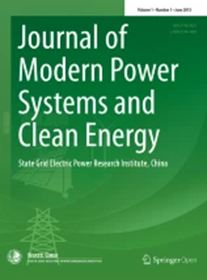Multi-Time-Scale Optimal Scheduling of Integrated Energy System with Electric-Thermal-Hydrogen Hybrid Energy Storage Under Wind and Solar Uncertainties
IF 6.1
1区 工程技术
Q1 ENGINEERING, ELECTRICAL & ELECTRONIC
Journal of Modern Power Systems and Clean Energy
Pub Date : 2024-12-13
DOI:10.35833/MPCE.2024.000606
引用次数: 0
Abstract
Hybrid energy storage is considered as an effective means to improve the economic and environmental performance of integrated energy systems (IESs). Although the optimal scheduling of IES has been widely studied, few studies have taken into account the property that the uncertainty of the forecasting error decreases with the shortening of the fore-casting time scale. Combined with hybrid energy storage, the comprehensive use of various uncertainty optimization methods under different time scales will be promising. This paper proposes a multi-time-scale optimal scheduling method for an IES with hybrid energy storage under wind and solar uncertainties. Firstly, the proposed system framework of an IES including electric-thermal-hydrogen hybrid energy storage is established. Then, an hour-level robust optimization based on budget uncertainty set is performed for the day-ahead stage. On this basis, a scenario-based stochastic optimization is carried out for intra-day and real-time stages with time intervals of 15 min and 5 min, respectively. The results show that ①the proposed method improves the economic benefits, and the intra-day and real-time scheduling costs are reduced, respectively; ②by adjusting the uncertainty budget in the model, a flexible balance between economic efficiency and robustness in day-ahead scheduling can be achieved; ③ reasonable design of the capacity of electric-thermal-hydrogen hybrid energy storage can significantly reduce the electricity curtailment rate and carbon emissions, thus reducing the cost of system scheduling.风能和太阳能不确定性下电-热-氢混合储能综合能源系统的多时间尺度优化调度
混合储能被认为是提高综合能源系统经济和环境性能的有效手段。尽管对IES最优调度问题的研究已经非常广泛,但很少有研究考虑到预测误差的不确定性随着预测时间尺度的缩短而减小。与混合储能相结合,综合利用不同时间尺度下的各种不确定性优化方法将具有广阔的应用前景。提出了一种具有风能和太阳能不确定性的混合储能系统的多时间尺度优化调度方法。首先,建立了包含电-热-氢混合储能系统的系统框架。然后,对日前阶段进行了基于预算不确定性集的小时级鲁棒优化。在此基础上,分别以15 min和5 min的时间间隔对日内和实时阶段进行基于场景的随机优化。结果表明:①所提方法提高了经济效益,降低了日内调度成本和实时调度成本;②通过调整模型中的不确定性预算,可以实现日前调度的经济性与鲁棒性之间的灵活平衡;③合理设计电-热-氢混合储能容量,可显著降低弃电率和碳排放,从而降低系统调度成本。
本文章由计算机程序翻译,如有差异,请以英文原文为准。
求助全文
约1分钟内获得全文
求助全文
来源期刊

Journal of Modern Power Systems and Clean Energy
ENGINEERING, ELECTRICAL & ELECTRONIC-
CiteScore
12.30
自引率
14.30%
发文量
97
审稿时长
13 weeks
期刊介绍:
Journal of Modern Power Systems and Clean Energy (MPCE), commencing from June, 2013, is a newly established, peer-reviewed and quarterly published journal in English. It is the first international power engineering journal originated in mainland China. MPCE publishes original papers, short letters and review articles in the field of modern power systems with focus on smart grid technology and renewable energy integration, etc.
 求助内容:
求助内容: 应助结果提醒方式:
应助结果提醒方式:


